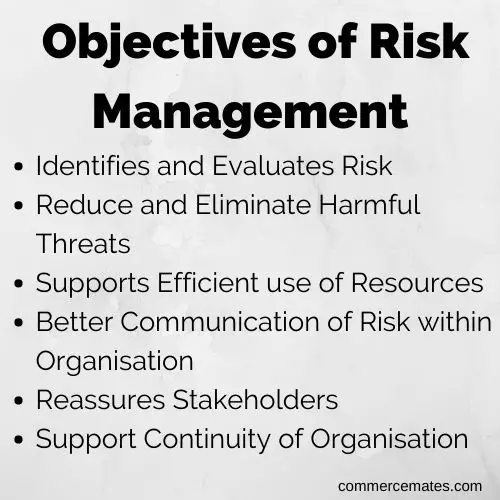Contents
Meaning of Risk Management
Risk management is a technique of controlling and avoiding threats to business organisation. It involves determining, analyzing and mitigating harmful risk to an organisation’s capital and earnings. Risk management is a practice which is required and followed by every business irrelevant of their size and nature. It aims at recognizing the potential threats in advance and takes all necessary steps to avoid their adverse effects on business operations.
These risks and unfortunate events are faced by every business organisation and may harmfully affect its capital or even may lead to its permanent closure. Timely identification and prioritization of these risks are quite important which is all done by implementing risk management techniques.
Risk management is a continuous process and works throughout the life of the project towards monitoring all risk factors. It focuses on controlling all possible future events by analyzing various past information like the probability of occurrence, historical data, lessons learned etc. Risk management supports the organisation in the achievement of their goals by ensuring that all activities are running on their normal track. It develops a safe and secure work environment for all staff and customers and increases the stability of business operations. Objectives of Risk management are discussed in the following points:
Objectives of Risk Management

Identifies and Evaluates Risk
Risk management identifies and analysis various risk associated with business. It identifies risk at early stages and takes all necessary steps to avoid their harmful effects. Information from past is analysed to recognise all possible future unfortunate events. Risk management properly evaluates risk originated in business and develops a proper understanding regarding its real causes. This all help in taking all measures in mitigating the effects of these risks.
Reduce and Eliminate Harmful Threats
Harmful risks and threat are part of every business organisation. They have negative effect on productivity and profitability of business. Risk management techniques helps in avoiding and reducing the effect of these threats to business. Risk manager formulates strategic plans for each department and monitors their performance from time to time.
These perform series of workshop in organisation to develop proper understanding regarding risk causes and how to overcome them among all employees. Managers guide them in avoiding the identified faults and reduces these harmful threats.
Supports Efficient use of Resources
Risk management aims at efficient utilisation of all resources. Fuller utilisation leads to better productivity and increased profits. Risk management techniques support strategic planning for better results. It sets plans for functioning of business and ensures that all activities are going on their planned track. Certain targets are set for each division within organisations and perform routine check-ups from time to time. If any deviations arise, it takes all possible steps.
Better Communication of Risk within Organisation
Risk management develops better communication network between directors, managers and employees. It helps in spreading all information regarding risk easily around the organisation timely. All people are able to interact with each other effectively and discuss about core solution about these risk. This helps in better understanding of several threats and taking timely action against them.
Reassures Stakeholders
Stakeholders are an important part of every business organisation. Business must aim at serving the interest of its stakeholders for their support. Risk management helps in increasing the confidence of stakeholders in business and assures them of non-occurrence of any unfortunate incident.
They feel safe by the implementation of risk management techniques that will timely control and avoid all harmful risk. This leads to better trust among business and its stakeholders.
Support Continuity of Organisation
Risk management has an efficient role in long term growth and survival of the business. Every business faces several risk and unfortunate events during its life cycle. These unfortunates, if not treated timely, will affect the organisation capital and profit or even leads to its termination.
It avoids all these risks by monitoring continuously the operations throughout the life of the project. It reduces anxiety by overcoming all fear of uncertainty and develops a safe working environment within the organisation. This increase the productivity and overall stability of business organisations.